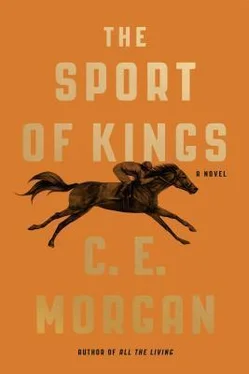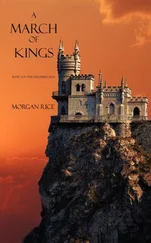On many days, she shadowed her father on the grounds as he consulted with Barlow, called his bloodstock agent, his lawyers, read the Racing Form , and made his travel plans around the racing season. He sent her off with one of the female grooms, who taught her the duties of the broodmare barn, how to muck the stalls and change hay, how to lave the horses and pick their hooves, to detect when the mares turned temperamental in estrus. Henrietta often accompanied Henry to Keeneland to watch Forge horses in their early-morning workouts, the animals wheeling in and out of the cool mist, their breath blooming. The pair made an odd couple of railbirds: the man tall, thin, and talkative, the girl tall, thin, and quiet, both sipping coffee from paper cups. The girl held a silver stopwatch in her free hand and soon knew the horses by their gaits, the track speed by the report of hooves, the trainers by their curses, the jocks by the curve of their spines as they bowed over their mounts, and a year passed.
She took thrice-weekly riding lessons on the other side of Paris; this was something her father demanded. The other girls arrived with their hair scraped back into neat tails, their high boots shined to a gloss. Henrietta’s boots were caked with old, dry manure the color of mastic. She was deeply tan to the others’ schoolkept pallor. She lasted there only four months, by then a rider equal to her instructor, a seeming natural with no fear of the animal, but no discernible love either. She rode as though she were walking, the horse like the ground beneath her feet, and another year passed.
Only Henrietta’s nights were her own. During these hours, while lying in bed perusing the old books, she discovered the ultimate luxury, which was solitude. She tried her best to like the poetry that her father admired, but the Greeks bored her, and, besides, that was all part of her morning lessons. She tried the poems from an anthology she found and liked some, especially those that made no claims, strove for nothing but the revelation of a small, beautiful thing — a vase or a blackbird. But she read no novels, finding them a waste of time. She resisted how they worked on her, asking her to suffer on someone’s behalf. If they had no madness in them, they were useless; genius doesn’t speak with the limited tongue of sense. Her father taught her that.
What roused her to an almost pained interest, what caused her to copy down long passages into her notebooks and stay awake into the night, her mind running like a stallion on a track, was the mystery of the earth’s composition and all of its inhabitants. She devoured the books that had belonged to her great-great- in-aeternum -grandfathers — atlas volumes, topographical maps, weathered pamphlets from the Geological Survey, the tomes of Lamarck and Darwin and Lyell; also physiographic diagrams, strata illustrations, and expedition records, which together told the brute story of geology, how it grew continents and plant populations, gave them life and dug their graves. She slowly discerned that Kentucky was a strange and abundant place, half-mad with a restless and protean geology, secreted away under a cloak of limestone and swaying seas of timothy and bluegrass. She came to believe that the earth longed to be known. So she pressed one ear to the lip of its mouth, listening to tales that babbled up from its karsty throat, from jagged fissures in the sandstone hills, gurgling streambeds and salt licks. She learned how the primordial state had formed itself from the mystery of swirling sedimentary detritus under Paleozoic seas: sandstone out of inky silt and sand; clay and black shale from viscous mud that settled like a pitch lime on the Devonian beds before millennial tides rolled back and forth; also layers of friable igneous rock, bits of charred matter that traveled from the hot center of the earth; gravel and nameless shards scrabbled together into conglomerates; delicate, fluted shells forming sleek, packed limestone that made up the thickest strata, four hundred million years old and counting. Casket-gray and underscoring half the state, the preterite limestone founded the old Mississippian plateau with their faulted escarpments and the steep barrowing knobs, which Samuel Forge had spied as he stood with Ben at the verge of what would be Madison County, surveying the thin soils of the Outer Bluegrass, which was itself cinched tight by a belt of Eden Shale. It was in the core of the Bluegrass that limestone, sandstone, dolomite, and shale were pressed together like the layers of an earthen cake, until a massive upwarping formed the Cincinnati Arch, where the young, thin stones were soon eroded by ferocious winds, and the limestone found itself naked before the elements, runnelled and pocked by water until it had transformed itself into karst, a tumulous landscape of sinking streams, sinkholes, caves, and soil so wildly fecund that men lost their religion for a share. It was a rolling dreamscape, a heaven for the raising of crops and horses — better than the modest farmland of the Pennyroyal plains, the coalfields, and Western embayment, which sloped down to the alluvial foreshores of the Mississippi River.
In the Appalachian Mountains, the oldest mountains on earth, a different tale was told. There, organic matter had compressed into bituminous coal. Five hundred million years before Henrietta was born, those mountains extended all the way down into the extraterrestrial deserts of West Texas, pressed into being by the clashing of two young continents, which closed the Iapetus Ocean — an ocean so old it gave birth to the Atlantic — thrusting the abyssal plains and all their doomed marine life into the air like an offering for the gods. As the mountains rose and heaved and eroded, generations of saplings tumbled into the swamps, and hairy grasses too, seed coats, stamens, involute gondola leaves, chips of bark, white and chocolate roots, mosses mixed with stringy vines, hardy stamens, and even the gentle, primordial flower beds in the height of their flowerage fell too soon like the mayflies, dropping their leaves and tumbling into the self-heating morass, which, under the slurried sediment of Mesozoic seas, turned all the fallen vegetal world to rich, flammable peat. But the peat was covered and itself compressed and, with a mountain atop it, vanquishing its air, was tamped and starved into coal, thin, glossy, striate seams of carbon between dingy Pennsylvanian stones, thin, dark pages in a long, long book—
You can close a book, which she did. But then she would just lie there charged, apprehensive, electric, confused. She knew that men extracted coal and sometimes died in the mining. She wondered at their deaths. Was it childish to ask why? How many mountains had been uprooted to light a home like hers? And all the churches dotting the state? Fathers felled the world their children were supposed to live in, Tantalus eternally slaughtering his Pelops. Was it worth it? Was this farm worth it? Was the human nothing but a machine that extracted coal from the hills and horses from the fields? Civilization stood at the ready with its answers, but she bypassed those answers for a deeper, stranger question: What was the earth itself? This teeming, generative thing, which forced human life in a hothouse, only to turn that life like compost back into the soil. She was thirteen, but geological time was 4.6 billion years old. She had just gotten her period, only to discover there was nothing fixed in the geographical world. Even the poles moved. She discovered in her a deep, deep dread, but it wasn’t like a horse, you couldn’t just assign it a name. You had to discover its name. She suffered from the realization that others had been asking these questions long, long before her, but to no avail. The old books all agree: God is a terror.
* * *
On Valentine’s Day when she was thirteen, Henrietta saw her first mare bred.
Читать дальше
Конец ознакомительного отрывка
Купить книгу












